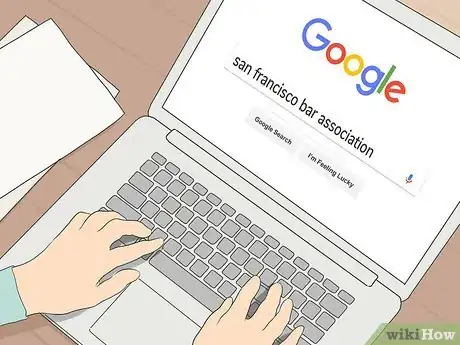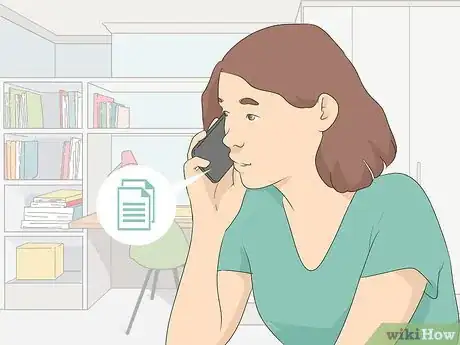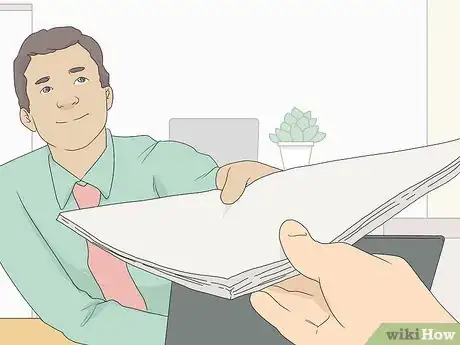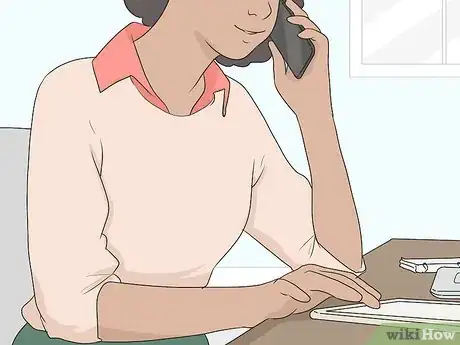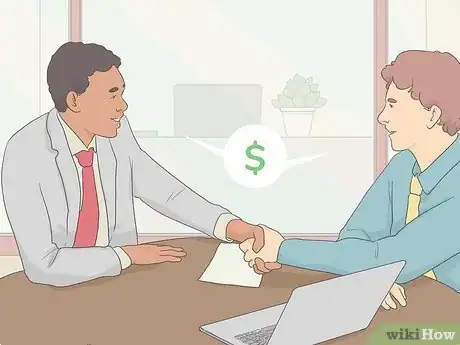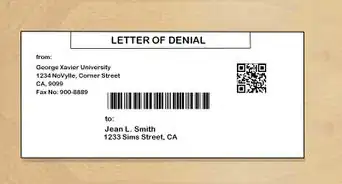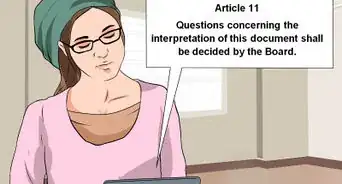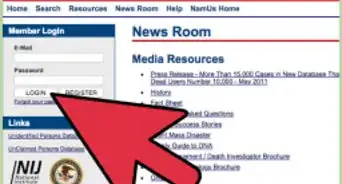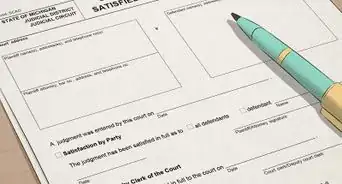This article was written by Jennifer Mueller, JD. Jennifer Mueller is an in-house legal expert at wikiHow. Jennifer reviews, fact-checks, and evaluates wikiHow's legal content to ensure thoroughness and accuracy. She received her JD from Indiana University Maurer School of Law in 2006.
This article has been viewed 9,875 times.
Anytime you're faced with a legal issue and aren't sure if you can resolve it on your own, it's a good idea to talk to a lawyer — even if you end up ultimately not hiring anyone to help you. Start by getting names and contact information of at least 2 or 3 lawyers who could potentially help you. Then, call or send an email to each one asking to schedule a consultation to discuss your issue in more depth. Although you might be nervous, talking to an attorney will be less intimidating if you're thoroughly prepared to explain your issues and your goals to resolve the case.[1]
Steps
Finding Potential Attorneys
-
1Ask friends and family for recommendations. If you have family or friends who have previously consulted an attorney for a similar legal matter, they might be able to give you some names of attorneys to talk to. If they had a bad experience, they can also help you identify attorneys you might want to stay away from.[2]
- When talking to friends and family, keep in mind that every case is different. An attorney who wasn't able to help them might be able to help you, depending on your individual circumstances.
- Also take personality into consideration. If someone you know didn't get along with an attorney, there might have been a simple mismatch of personalities. For example, a sensitive and emotional friend might have had problems with an attorney who happened to be more straightforward and analytical.
-
2Use a bar referral service to get matched with an attorney. Do an internet search for the name of your city or town and the words "bar association" to find the website of your local bar association. On the bar association's website, you'll often find a tab or link for a referral service.[3]
- To use the referral service, you typically provide some basic information about the kind of legal issue you need help with. You may also be asked questions about the type of representation you want. The service will then produce the names of a few attorneys in your area who could potentially represent you.
- Some bar associations have specialty divisions. These attorneys specialize in particular types of cases. For example, you might have attorneys who specialize in family law or in estate planning. Typically, these attorneys take additional courses to be certified as specialists in that particular area.
Tip: The benefit of using a bar association referral service is that you can be assured that the attorneys recommended are licensed and in good standing with the bar that referred them.
Advertisement -
3Search online for attorneys in your area who take cases like yours. Most attorneys have websites that provide information about their professional background and experience and the types of cases they handle. Search for "attorney" or "lawyer" along with the type of case you have, such as "divorce" or "landlord/tenant."[4]
- Evaluate the quality of the website and how easy it is to navigate and find the information that you're looking for. Skim through the content on the website. Avoid contacting attorneys who have websites with clunky design, dated graphics, or content that's full of typos.
- Keep in mind that an attorney's website is a marketing tool. They are trying to persuade you to hire them. Recognize that any reviews or testimonials you see on the attorney's website will likely be biased in their favor.
-
4Dig into an attorney's background before you contact them. Especially if you've found an attorney on your own, either online or through friends, you want to make sure that their license to practice is active and in good standing. You can also check whether they've been brought up on any disciplinary charges. If an attorney has been disciplined, that doesn't necessarily mean they're a bad lawyer. However, you probably want to think twice before you hire them to represent you.[5]
- You also want to find out how long the attorney has been practicing law and what kind of cases they normally take. If an attorney practices in several different areas of law, they might not have the depth of experience necessary to handle your case effectively.
- Do an online search of the attorney's name to find out if they've been in the news or if there are any reviews of them online. Doing searches like this, you may uncover negative reviews that wouldn't be published on the attorney's website.
- Take online reviews with a grain of salt. People whose legal cases don't come out the way they wanted them to are often quick to blame their attorney, even if their attorney was not to blame. At the same time, if an attorney has a significant number of negative reviews, you might want to reconsider talking to them.
Tip: Pay close attention to reviews from people who claim that the attorney was hard to get ahold of or rarely communicated with them about their case.
Making First Contact
-
1Write down what you're going to say before you call. You don't want to be stammering when you introduce yourself to an attorney, so make yourself a basic script before you pick up the phone to call their office for the first time. Tell them your full name and a basic description of your legal issue and what you want to accomplish.[6]
- For example, if you're calling an attorney about a divorce, you might write down, "My name is Sally Sunshine and my partner and I have decided to divorce. I'd like to talk to an attorney about custody of our children and what will happen to our house, which is in both of our names."
- If you're calling an attorney because you've already received court papers, on the other hand, you want to be more specific. For example, you might write down, "My name is Peter Pepper and today I was served with a summons regarding a credit card that went into collections. The date on the summons is February 14. I believe this lawsuit was filed in error and I would like to get it dismissed."
Tip: If you've been served with court papers, let the attorney know any deadlines from the outset. This may determine whether or not they're able to take your case.
-
2Call during regular business hours. Attorneys typically have their office hours listed on their website. Generally, the best time to call is first thing in the morning early in the week. Avoid calling at lunchtime or in the afternoon, when the attorney might not be in their office.[7]
- Typically you'll talk to a receptionist or legal assistant before you talk to the attorney. However, some solo practitioners answer their own phones. If you talk to a receptionist or legal assistant, let them know the name of the attorney you want to speak to.
- At some small firms, they will simply answer the phone "law office." You can either ask who you're speaking to or ask to speak to the attorney directly.
-
3Ask to schedule an initial consultation. After you've given a brief description of the legal matter you're facing, state that if the attorney is taking on new clients you'd like to schedule a meeting to discuss the matter further. Generally, it's a good idea to have a few dates in mind when you could meet with them.[8]
- Many attorneys offer free initial consultations. However, unless you already know from the attorney's website that they offer this, be prepared to pay a fee. Find out how much the fee will be and what methods of payment the attorney accepts.
- Repeat the date and time of the consultation to confirm that you heard it correctly.
-
4Find out what you need to bring with you to your appointment. Depending on the nature of your case, the attorney will likely want you to bring documents and information with you. They may have a list for you of documents you need to gather. They may also have forms for you to fill out.[9]
- Sometimes a legal assistant will do an "intake interview" over the phone in which they ask you questions about your case. This is more common with legal clinics.
- If the attorney has paperwork for you to fill out, you can typically get it emailed to you. If that isn't possible, find out if you can come by the office a couple of days before your consultation to fill out your paperwork. That way, the attorney will have time to look it over before your consultation.
-
5Send an email if you're uncomfortable talking on the phone. If you get nervous or anxious talking on the phone, get the attorney's email address from their website and send them an email instead. Use a descriptive subject line, such as "Initial Consultation Requested" followed by your name and the subject of your case.[10]
- For example, your subject line might be "Initial Consultation Requested — Divorce; Sally Sunshine."
- State upfront that you aren't comfortable talking on the phone. The attorney should be willing to work with you on that. If they're not, they're probably not the attorney you want to hire.
- Introduce yourself, including your first and last name, and then provide a brief description of your case. For example, if you are getting a divorce, you might write, "My name is Sally Sunshine and last week my partner asked me for a divorce. I got your name from the Bayview Bar Association's referral service and would like to schedule an initial consultation with you to discuss custody issues and how to handle our family home."
- Give the attorney your contact information as well as some information about your availability. For example, you might let them know that you are only available in the afternoon. Close your email by thanking the attorney for their time and attention.
Having Your First Consultation
-
1Send any requested documents ahead of your appointment. How far in advance you send the documents depends on how long you have before your appointment and the urgency of your legal matter. Ideally, get the documents to the attorney at least 2 days before the appointment so they have time to look over them before they meet with you.[11]
- If you have access to a scanner, you might scan your documents and email them to the attorney. You can also drop by the office and leave your documents before your appointment. Typically, you won't want to rely on mail, as your documents may not get there before your appointment.
-
2Write down a list of questions for the attorney. In addition to asking questions about your case, you'll also want to ask your attorney questions about their background and experience with cases similar to yours. You'll also want to ask questions about their practice style so you can make sure they're someone you can work with.[12]
- For example, if you don't like talking on the phone, you wouldn't want to hire an attorney who prefers talking on the phone and doesn't like emails.
-
3Gather any additional documents or information you want to show the attorney. Take some time before your appointment to pull together all documents that are related to your legal issue. The attorney doesn't know what documents you have, so include anything that's related to your case, even if the attorney didn't specifically request it.[13]
- For example, if you're seeing an attorney about a divorce, you would want bank and credit card statements, your marriage certificate, birth certificates for your children, and tax returns. However, if you and your partner have been exchanging emails or text messages related to the divorce, you might also want to make copies of those for your attorney to read.
- If you've already been served with court papers, bring those court papers with you, along with any documents related to that case. For example, if you're being sued to recover a debt, you would want to bring any credit card or collection statements you have related to the debt.
Tip: Make photocopies for your records of any original documents you give to your attorney. Keep them all together in a file so you know what documents you've given to your attorney.
-
4Arrive at least 15 minutes before the time of your appointment. Not only is being late unprofessional, but you could limit the amount of time the attorney has to spend with you. Plan to get there early so you're prepared for any unforeseen traffic issues. The attorney also may have forms they want you to fill out before your appointment.[14]
- You don't necessarily have to dress professionally, but you should make sure whatever you wear is clean and neat.
- If you have children, arrange for someone to take care of them while you're in your meeting. Don't bring them with you to the attorney's office unless it is completely unavoidable.
-
5Listen critically to what the attorney has to say. Particularly if an attorney offers a free initial consultation, they are essentially making a sales pitch. They want you to hire them as your attorney. Question everything the attorney says to make sure you get the most out of the consultation.[15]
- Be skeptical of any attorney who guarantees a specific result or promises that you'll be satisfied. These aren't things they have any control over.
-
6Take notes throughout the consultation. Bring a notepad and pen with you to the appointment so you can write down things the attorney says as well as your own thoughts and observations. If you have a question about something the attorney has said, write it down so you can ask it later.[16]
- Your notes enable you to go over the consultation later. You can also compare them to your notes from your consultations with other attorneys when you're deciding which attorney you want to hire.
Tip: Pay attention to their personality and how they make you feel as well. If the attorney makes you feel uncomfortable or uptight, they might not be the best attorney for you. It can be difficult to open up and be completely honest with someone who makes you uncomfortable.
-
7Follow up with the attorney no later than a week after the appointment. After you have an initial consultation with the attorney, take some time to look over your notes and reflect on your experience. If you have consultations scheduled with other attorneys, have those before you make a final decision (unless you know after that first meeting that you don't want to hire that attorney). If you decide to go with another attorney, call the others you've talked to and let them know you're going with someone else.[17]
- Keep in mind that after an initial consultation, an attorney has likely already started doing some basic groundwork on your case. They may have created a file for your case in their office, for example, As soon as you know you're not going to hire them, let them know. That way, they won't do any more work than necessary. Be sure to thank them for their time.
- If you've decided to hire an attorney, you also want to contact them as soon as possible so they can get to work on your case. This is especially important if you've already been served with papers and have a deadline looming.
-
8Get a fee agreement in writing before the attorney starts working for you. Find out how you'll pay your attorney and when your attorney will expect payment. There are 3 basic types of fee agreements attorneys make:[18]
- With a contingency fee agreement, you don't have to pay any attorney's fees until you settle your case or win your case in court. These fee agreements are common in car accident and negligence cases. You may still have to pay some basic costs — get an itemized list of these in writing.
- If your attorney is on retainer, you'll pay them a set amount of money upfront. The attorney bills for the time they spent on your case, typically in 6-minute increments. After they've exhausted your retainer on time and other expenses, you'll receive a bill, typically once a month, for attorney's fees. This is typically the most expensive way to hire an attorney.
- For many basic legal matters, such as divorce and estate planning, attorneys will charge a flat fee. This flat fee takes court costs and other expenses into account. Some flat-fee attorneys charge on a sliding scale depending on your income.
References
- ↑ http://www.calbar.ca.gov/Public/Free-Legal-Information/Legal-Guides/Finding-the-Right-Lawyer
- ↑ https://www.consumer.ftc.gov/articles/0180-hiring-lawyer
- ↑ http://www.calbar.ca.gov/Public/Free-Legal-Information/Legal-Guides/Finding-the-Right-Lawyer
- ↑ http://www.calbar.ca.gov/Public/Free-Legal-Information/Legal-Guides/Finding-the-Right-Lawyer
- ↑ https://www.consumer.ftc.gov/articles/0180-hiring-lawyer
- ↑ https://www.consumer.ftc.gov/articles/0180-hiring-lawyer
- ↑ http://www.calbar.ca.gov/Public/Free-Legal-Information/Legal-Guides/Finding-the-Right-Lawyer
- ↑ http://www.calbar.ca.gov/Public/Free-Legal-Information/Legal-Guides/Finding-the-Right-Lawyer
- ↑ https://www.consumer.ftc.gov/articles/0180-hiring-lawyer
- ↑ https://www.floridabar.org/public/consumer/pamphlet018/
- ↑ https://www.consumer.ftc.gov/articles/0180-hiring-lawyer
- ↑ https://hirealawyer.findlaw.com/choosing-the-right-lawyer/ten-questions-to-ask-your-potential-lawyer.html
- ↑ http://www.calbar.ca.gov/Public/Free-Legal-Information/Legal-Guides/Finding-the-Right-Lawyer
- ↑ https://www.lawyers.com/legal-info/research/meeting-with-a-lawyer.html
- ↑ http://www.calbar.ca.gov/Public/Free-Legal-Information/Legal-Guides/Finding-the-Right-Lawyer
- ↑ http://www.calbar.ca.gov/Public/Free-Legal-Information/Legal-Guides/Finding-the-Right-Lawyer
- ↑ http://www.calbar.ca.gov/Public/Free-Legal-Information/Legal-Guides/Finding-the-Right-Lawyer
- ↑ http://www.calbar.ca.gov/Public/Free-Legal-Information/Legal-Guides/Finding-the-Right-Lawyer

